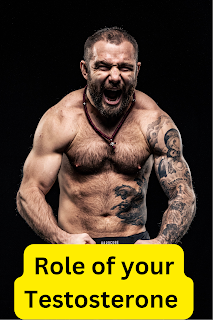What is the role of your Testosterone for Erectile Dysfunction (ED)
Testosterone
plays a significant role in maintaining various aspects of male sexual health,
including the function of the reproductive system and sexual desire. While it
is not the sole determinant of erectile
function, it does contribute to overall sexual health. Testosterone
influences erectile function in the following ways:
Libido
Testosterone
is crucial for regulating sex drive or libido. Adequate levels of testosterone
are associated with a healthy sex drive, which can contribute to the overall
sexual function, including the ability to achieve and maintain an erection.
Nitric Oxide Production
Testosterone
helps stimulate the production of nitric oxide, a molecule that plays a key
role in dilating blood vessels and improving blood flow. Sufficient blood flow
to the penis is essential for achieving and maintaining an erection.
Read Also: - Is Viagra Safe? Understanding the Safety and Dosage of Viagra
Muscle Mass and Strength
Testosterone
contributes to the maintenance of muscle mass and strength. A healthy
musculoskeletal system, including the pelvic floor muscles, can have a positive
impact on erectile function.
Mood and Energy
Testosterone
also influences mood and energy levels. Low testosterone levels can lead to symptoms such as
fatigue, low energy, and a decrease in overall well-being, which can indirectly
impact erectile function.
However,
it's important to note that while testosterone is a factor in erectile
function, it is not the sole determinant. Other physiological, psychological,
and lifestyle factors can also contribute to erectile dysfunction. Therefore,
in cases of erectile dysfunction, it is essential to consult a healthcare
provider to identify the underlying causes and determine the most appropriate
treatment plan, which may include addressing testosterone levels along with
other potential contributing factors.
Boosting testosterone
levels can potentially help improve erectile dysfunction (ED) in some cases. However, it's essential to consult a healthcare provider
before attempting any testosterone-boosting methods to ensure safety and
effectiveness.
Read Also: - How can levitra Help Solve My ED Problems?
Here are
some natural ways that may help boost testosterone levels:
Exercise Regularly
Engaging in
regular physical activity, including both aerobic and resistance training, can
help boost testosterone levels. Aim for at least 150 minutes of moderate
aerobic activity or 75 minutes of vigorous activity per week, along with
strength-training exercises at least twice a week.
Maintain a Healthy Weight
Obesity and excess body fat can contribute to
lower testosterone levels. Therefore, maintaining a healthy weight through a
balanced diet and regular exercise may help improve testosterone levels and
subsequently improve erectile function.
Get Sufficient Sleep
Inadequate
sleep can negatively impact testosterone levels. Aim for 7-9 hours of quality
sleep each night to support hormonal balance and overall health.
Manage Stress
Chronic
stress can lead to increased cortisol levels, which may suppress testosterone
production. Practicing stress-reduction techniques such as meditation, yoga,
deep breathing exercises, and engaging in hobbies can help manage stress levels
and support healthy testosterone levels.
Healthy Diet
Consuming a
well-balanced diet rich in nutrients such as zinc, vitamin D, and healthy fats
can support testosterone production. Include foods like lean meats, nuts,
seeds, whole grains, fruits, and vegetables in your diet.
Limit Alcohol and Quit Smoking
Excessive
alcohol consumption and smoking can negatively affect testosterone levels.
Limit alcohol intake and consider quitting smoking to support overall health
and hormone balance.
Consider Testosterone Replacement
Therapy (TRT)
In cases of
clinically low testosterone levels, a healthcare provider may recommend
testosterone replacement therapy. It's crucial to undergo this treatment under
medical supervision to monitor its effects and ensure safety.
It's
important to note that the effectiveness of these methods can vary depending on
individual health conditions and underlying causes of erectile dysfunction.
Therefore, consulting a healthcare provider is crucial to determine the most
suitable approach for addressing testosterone-related erectile dysfunction.
Read Also: - How To Make Happy Married Life

.png)



Comments
Post a Comment